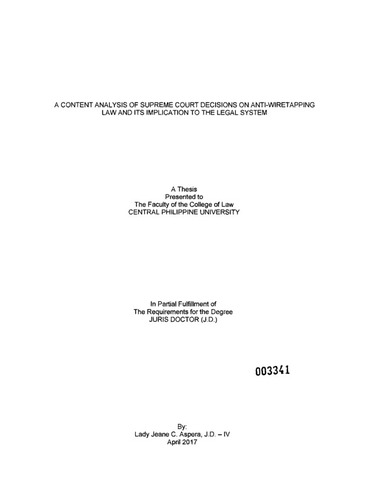A content analysis of Supreme Court decisions on Anti-Wiretapping Law and its implication to the legal system

Page views
2,119Petsa
2017May-akda
Tagapayo ng Tesis
Tagapangulo ng Panel ng Depensa
Magbahagi
Metadata
Ipakita ang buong tala ng item
Abstract
Albert Einstein said: “The strength of the Constitution lies entirely in the determination of each citizen to defend it. Only if every single citizen feels duty bound to do his share in this defense are the constitutional rights secure.” Article III, section 3 of the 1987 Philippines Constitution substantially provides for the protection of every citizen of the right to privacy of communication and correspondence. It shall be inviolable except upon lawful order of the court, or when public safety or order requires otherwise as prescribed law. Additionally, any evidence obtained in violation of this provision shall be inadmissible in evidence for any purpose in any proceeding. The Bill of Rights is not meant to invoke against act of private individuals but it is directed against the government and its agencies tasked with the enforcement of the law. This constitutional provision is strengthened through R.A. No. 4200 or the Anti-wiretapping law. Moreover, the law similarly aims to prevent officers of the government of spying on one another which it refers to as a “most obnoxious instrument of oppression or arbitrary power.”
Paglalarawan
Abstract only
Mungkahing Sipi
Aspera, L. J. C. (2017). A content analysis of Supreme Court decisions on Anti-Wiretapping Law and its implication to the legal system (Unpublished postgraduate thesis). Central Philippine University, Jaro, Iloilo City.
Uri
ThesisMga Paksa
Mga keyword
Kagawaran
College of LawDegree
Juris DoctorLokasyon ng Istante
Law Library 340.72 As64
Pisikal na paglalarawan
viii, 50 leaves
Collections
- Juris Doctor [144]
Ang mga sumusunod na mga file ng lisensya ay naiugnay sa item na ito:


